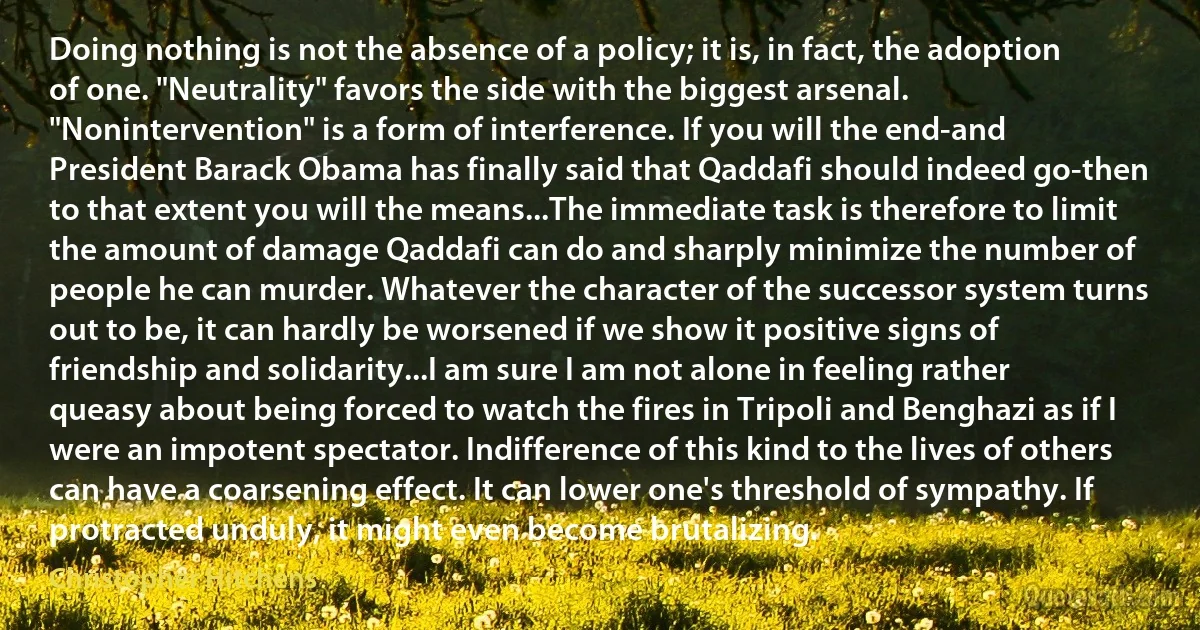Interference Quotes - page 3
The free-traders were against all State interference of any kind; they were against the Factory Act, they were opposed to the laws to prevent fraud and adulteration, especially in the interests of the working classes, they were against trade unions, they were in favour of unlimited competition, they would buy everything in the cheapest market and especially labour. ... we cannot logically and consistently attempt to defend labour against unfair competition without defending at the same time against unfair competition the product of that labour.

Joseph Chamberlain
I have no intention of slurring over the differences we have with socialism, nor concealing my belief that we are the National Party of Great Britain, representing not narrow class interest, nor the bigotry of the left wing intellectuals, but all those who support the British tradition of democracy, of personal freedom, of personal responsibility for one's own affairs and those of one's family, with the least possible interference from the State.

Norman Tebbit
He (Mr. Cobden) wanted hon. Gentlemen opposite to bring in a little head, as well as a little heart, when they were dealing with this question...he trusted the time was coming when men would no longer rush into hasty legislation prompted by feelings of benevolence and philanthropy alone, but repudiating the facts of that science which taught how to legislate with something like probability of the result being for the general benefit of the community. He did not oppose interference between masters and men for the sake of employers alone; he opposed all interference whatever with the labour of adults, primarily for the sake of the adults themselves. If they were to establish the principle that Parliament would not interfere at all with labour, and would not interfere between masters and workmen, it would be the best thing for the working men that that House could do.

Richard Cobden
... there is nothing that the most prominent men in the Liberal party more earnestly desire than that labour representation, direct labour representation, shall be as large as possible... It is sometimes said to me, "Oh! but you are against State intervention in matters of great social reform". At this time of the day it would be absurd for any man who has mastered all the Mining Regulations Acts, the Factories Acts, the great mass of regulation which affects trade; it would be absurd for any man to stand on a platform and say he was entirely against State intervention. I, for my part, have never taken that position... My own belief is that in the matters of hours and of wages for adult male labour the interference would be a bad and mischievous thing... that in such matters, for example, as housing of the poor and so forth, the proper machinery through which to carry out these operations is municipal and not Parliamentary.

John Morley, 1st Viscount Morley of Blackburn
There are good people who, being discontented with present-day conditions, think that these conditions can be cured by a return to what they call the "principles of the fathers.” [...] But to go back to the governmental theories of a hundred years ago would accomplish nothing whatever; for it was under the conditions of unrestricted individualism and freedom from Government interference, countenanced by those theories, that the trusts grew up, and private fortunes, enormous far beyond the deserts of the accumulators were gathered. [...] It may be that, in the past development of our country, complete freedom from all restrictions, and the consequent unlimited encouragement and reward given to the most successful industrial leaders, played a part in which the benefits outweighed the disadvantages. But nowadays such is not the case.

Theodore Roosevelt
Any country whose people conduct themselves well can count upon our hearty friendship. If a nation shows that it knows how to act with reasonable efficiency and decency in social and political matters, if it keeps order and pays its obligations, it need fear no interference from the United States. Chronic wrongdoing, or an impotence which results in a general loosening of the ties of civilized society, may in America, as elsewhere, ultimately require intervention by some civilized nation, and in the Western Hemisphere the adherence of the United States to the Monroe Doctrine may force the United States, however reluctantly, in flagrant cases of such wrongdoing or impotence, to the exercise of an international police power.

Theodore Roosevelt
I confess that I do not understand the principle on which the power to fix a minimum for the wages of women can be denied by those who admit the power to fix a maximum for their hours of work. I fully assent to the proposition that here as elsewhere the distinctions of the law are distinctions of degree, but I perceive no difference in the kind or degree of interference with liberty, the only matter with which we have any concern, between the one case and the other. The bargain is equally affected whichever half you regulate.... It will need more than the Nineteenth Amendment to convince me that there are no differences between men and women, or that legislation cannot take those differences into account.

Oliver Wendell Holmes Jr.
While the founding fathers agonized over the question 'particle' or 'wave', de Broglie in 1925 proposed the obvious answer 'particle' and 'wave'. Is it not clear from the smallness of the scintillation on the screen that we have to do with a particle? And is it not clear, from the diffraction and interference patterns, that the motion of the particle is directed by a wave? De Broglie showed in detail how the motion of a particle, passing through just one of two holes in screen, could be influenced by waves propagating through both holes. And so influenced that the particle does not go where the waves cancel out, but is attracted to where they cooperate. This idea seems to me so natural and simple, to resolve the wave-particle dilemma in such a clear and ordinary way, that it is a great mystery to me that it was so generally ignored.

John Stewart Bell
The nation and the government in Germany are one thing. The will of the people is the will of the government and vice versa. The modern structure of the German State is a higher form of democracy [ennobled democracy] in which, by virtue of the people's mandate, the government is exercised authoritatively while there is no possibility for parliamentary interference to obliterate and render ineffective the execution of the nation's will.

Joseph Goebbels
I stand, said Mr. Fox, upon this great principle. I say that the people of England have a right to control the executive power, by the interference of their representatives in this House of parliament. The right honourable gentleman [William Pitt] maintains the contrary. He is the cause of our political enmity.

Charles James Fox
Marijuana is the finest anti-nausea medication known to science, and our leaders have lied about this consistently. Arresting people for medical marijuana is the most hideous example of government interference in the private lives of individuals. It's an outrage within an outrage within an outrage.

Peter McWilliams
Mr. Chairman, when Oregonians first adopted the Death With Dignity Act and then defended it on a second ballot initiative, they sent their government a clear message. When the American people resisted government interference in the tragic case of Terri Schiavo, they sent their government a clear message. That message is that death is an intensely personal and private moment, and in those moments, the government ought to leave well enough alone.

Ron Wyden
The latest chapter of the venerable slasher film saga represents the tenth movie to use the title (although only the ninth with Myers); it's a sequel to the remake but not necessarily a remake of the sequel. It is also a complete and utter abomination. The film is so bad that it may make me rethink my stance on installment #6 (The Curse of Michael Myers) as the worst entry. That one, at least by all accounts, was severely compromised as a result of distributor interference. This one represents Rob Zombie's "vision."

James Berardinelli
It ought to be possible for American consumers of any color to receive equal service in places of public accommodation, such as hotels and restaurants and theaters and retail stores, without being forced to resort to demonstrations in the street, and it ought to be possible for American citizens of any color to register and to vote in a free election without interference or fear of reprisal. It ought to be possible, in short, for every American to enjoy the privileges of being American without regard to his race or his color. In short, every American ought to have the right to be treated as he would wish to be treated, as one would wish his children to be treated. But this is not the case.

John F. Kennedy

![The Syrian crisis must be resolved by a vote by Syrians. We are concerned by the civil war and foreign interference. The government [of President Bashar al-Assad] must be respected by other countries until the next [2014 presidential] elections and then it is up to the people to decide. (Hassan Rouhani)](https://cdn.quotesdtb.com/img/quotes_images_webp/05/hassan-rouhani-crisis-foreign-316205.webp)

